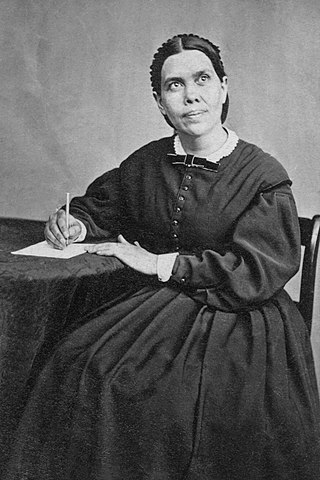Adventism is a branch of Protestant Christianity that believes in the imminent Second Coming of Jesus Christ. It originated in the 1830s in the United States during the Second Great Awakening when Baptist preacher William Miller first publicly shared his belief that the Second Coming would occur at some point between 1843 and 1844. His followers became known as Millerites. After Miller's prophecies failed, the Millerite movement split up and was continued by a number of groups that held different doctrines from one another. These groups, stemming from a common Millerite ancestor, collectively became known as the Adventist movement.

The Seventh-day Adventist Church (SDA) is an Adventist Protestant Christian denomination which is distinguished by its observance of Saturday, the seventh day of the week in the Christian (Gregorian) and the Hebrew calendar, as the Sabbath, its emphasis on the imminent Second Coming (advent) of Jesus Christ, and its annihilationist soteriology. The denomination grew out of the Millerite movement in the United States during the mid-19th century and it was formally established in 1863. Among its co-founders was Ellen G. White, whose extensive writings are still held in high regard by the church.

Ellen Gould White was an American author and co-founder of the Seventh-day Adventist Church. Along with other Adventist leaders such as Joseph Bates and her husband James White, she was influential within a small group of early Adventists who formed what became known as the Seventh-day Adventist Church. White is considered a leading figure in American vegetarian history. Smithsonian named her among the "100 Most Significant Americans of All Time".
The charismatic movement in Christianity is a movement within established or mainstream Christian denominations to adopt beliefs and practices of Charismatic Christianity, with an emphasis on baptism with the Holy Spirit, and the use of spiritual gifts (charismata). It has affected most denominations in the United States, and has spread widely across the world.

The Seventh-day Adventist Church had its roots in the Millerite movement of the 1830s to the 1840s, during the period of the Second Great Awakening, and was officially founded in 1863. Prominent figures in the early church included Hiram Edson, Ellen G. White, her husband James Springer White, Joseph Bates, and J. N. Andrews. Over the ensuing decades the church expanded from its original base in New England to become an international organization. Significant developments such the reviews initiated by evangelicals Donald Barnhouse and Walter Martin, in the 20th century led to its recognition as a Christian denomination.
In Seventh-day Adventist theology, there will be an end time remnant of believers who are faithful to God. The remnant church is a visible, historical, organized body characterized by obedience to the commandments of God and the possession of a unique end-time gospel proclamation. Adventists have traditionally equated this "remnant church" with the Seventh-day Adventist denomination.
The theology of the Seventh-day Adventist Church resembles early Protestant Christianity, combining elements from Lutheran, Wesleyan-Arminian, and Anabaptist branches of Protestantism. Adventists believe in the infallibility of the Scripture's teaching regarding salvation, which comes from grace through faith in Jesus Christ. The 28 fundamental beliefs constitute the church's current doctrinal positions, but they are revisable under the guidance of the Holy Spirit, and are not a creed.
Progressive Adventists are members of the Seventh-day Adventist Church who prefer different emphases or disagree with certain beliefs traditionally held by mainstream Adventism and officially by the church. While they are often described as liberal Adventism by other Adventists, the term "progressive" is generally preferred as a self-description. This article describes terms such as evangelical Adventism, cultural Adventism, charismatic Adventism, and progressive Adventism and others, which are generally related but have distinctions.
Niels-Erik Andreasen was the president of Andrews University in Berrien Springs, Michigan, from 1994 to 2016.
Alden Lloyd Thompson is a Seventh-day Adventist Christian theologian, author, and seminar presenter. He is also a professor of biblical studies at Walla Walla University in Washington, United States.
Historic Adventism is an informal designation for conservative individuals and organizations affiliated with the Seventh-day Adventist Church who seek to preserve certain traditional beliefs and practices of the church. They feel that the church leadership has shifted or departed from key doctrinal "pillars" ever since the middle of the 20th century. Specifically, they point to the publication in 1957 of a book entitled Seventh-day Adventists Answer Questions on Doctrine; which they feel undermines historic Adventist theology in favor of theology more compatible with evangelicalism. Historic Adventism has been erroneously applied by some to any Adventists that adhere to the teachings of the church as reflected in the church's fundamental beliefs such as the Sabbath or the Spirit of Prophecy. They misapply those who hold to mainstream traditional Adventist beliefs as synonymous with Historic Adventist.
Samuele R. Bacchiocchi was a Seventh-day Adventist author and theologian, best known for his work on the Sabbath in Christianity, particularly in the historical work From Sabbath to Sunday, based on his doctoral thesis from the Pontifical Gregorian University. Bacchiocchi defended the validity of the Feasts of the Lord, situated in Leviticus 23, he wrote two books on the subject. He was also known within the Seventh-day Adventist church for his opposition to rock and contemporary Christian music, jewelry, the celebration of Christmas and Easter, certain dress standards and alcohol.
Arthur Nelson Patrick was a Seventh-day Adventist theologian and historian. At the time of death, he was an honorary senior research fellow at Avondale College in New South Wales, Australia. He also worked in pastoral ministry, evangelism, religion teaching, academic administration, and hospital chaplaincy for the Seventh-day Adventist church.

Edward E. Heppenstall was a leading Bible scholar and theologian of the Seventh-day Adventist Church. A 1985 questionnaire of North American Adventist lecturers revealed Heppenstall was the Adventist writer who had most influenced them.
This article describes the relationship between the Seventh-day Adventist Church and other Christian denominations and movements, and other religions. Adventists resist the movement which advocates their full ecumenical integration into other churches, because they believe that such a transition would force them to renounce their foundational beliefs and endanger the distinctiveness of their religious message. According to one church document,
Seventh-day Adventists believe that Ellen G. White, one of the church's co-founders, was a prophetess, understood today as an expression of the New Testament spiritual gift of prophecy.
The Adventist Church of Promise is an evangelical Christian denomination which is both Sabbatarian Adventist and classical Pentecostal in its doctrine and worship. It was founded in Brazil in 1932 by pastor John August Silveira, as a split-off from the Seventh-day Adventist Church.
Jonathan M. Butler was a historian of religion. He was formerly employed as a lecturer by the Seventh-day Adventist Church.
Samuel Koranteng Pipim is a US-based Ghanaian author, speaker, and theologian. Trained in engineering and systematic theology, he based his office in Ann Arbor, Michigan, where, up until 2011, he ministered to students, faculty, and staff at the University of Michigan. He has authored and co-authored more than a dozen books. He has spoken around the world at events for youth, students, and young professionals. He helped begin and has sat on the board of directors for the Generation of Youth for Christ organization (GYC), a revival movement of Seventh-day Adventist youth in North America.
Charismatic Christianity is a form of Christianity that emphasizes the work of the Holy Spirit and spiritual gifts as an everyday part of a believer's life. It has a global presence in the Christian community. Practitioners are often called charismatic Christians or renewalists. Although there is considerable overlap, charismatic Christianity is often categorized into three separate groups: Pentecostalism, the Charismatic movement, and the neo-charismatic movement.


